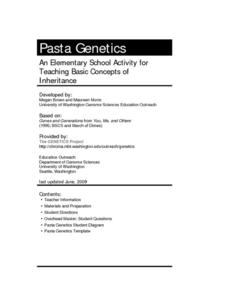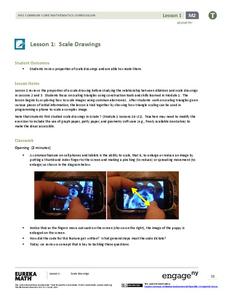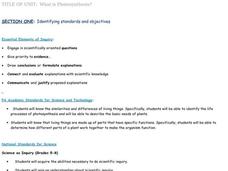Curated OER
Com-Post With Us? Learn About Recycling While Having Fun
Learners examine the importance of recycling to help the environment. In groups, they make a compost bin on the school grounds recording how the material changes from week to week. They collect other materials for recycling like cell...
Curated OER
Hand Writing: Three Letter Words
For this printing practice worksheet, students trace, form, and print three letter words. Students practice printing ten separate words.
Nuffield Foundation
Dissecting Lungs
Here is a lab activity where teens experience the respiratory system first-hand as they dissect lungs and identify key structures within the system. Although the website is written in British English with some slightly different verbiage...
Curated OER
The Sponges
In this sponge worksheet, students read about the different parts of a sponge and answer 20 short answer questions that follow. They color and label different sponge drawing.
Curated OER
Raven Chapter 35 Guided Notes: Plant Form
The ups and downs of plant vascular tissue are described by your beginning botanists as they complete this learning exercise. Xylem and phloem are defined and identified on actual color photographs. Functions of the different types of...
Curated OER
Round and Round
Learners interpret data from a three-dimensional array of current monitors to determine an overall pattern of water circulation. They hypothesize what effect an observed water circulation pattern might have on seamount fauna. A very...
IBM
The Human Body
Every moment, the systems in your body are working together to keep you breathing, standing, and thinking. Elementary schoolers explore the human body and its systems with an impressive, 15-page lesson plan that should leave your...
Curated OER
How Do Antiretroviral Drugs Work?
For this biology worksheet, students watch a series of videos and complete 10 short answer questions right after. They explain how ART drugs interrupt the life cycle of HIV.
Curated OER
Protists
Sort through the "junk drawer kingdom" as the protists laugh at our attempts to classify them! AP biology classes consider the array of organisms that do not file neatly into the other four kingdoms of classification. Evidence for the...
University of Washington
Pasta Genetics
Four different-shaped and dyed pasta types represent four different alleles. Following a guide sheet, young geneticists practice randomly selecting alleles and discover the traits of the resulting offspring. This is a fun and solid...
Curated OER
Electrochemistry Test Review
This review sheet will be very useful to test your pupils' understanding of battery structure and redox reactions. The questions ask for equations to be balanced and for the traditional equipment setups to be drawn and labeled....
Curated OER
Classification/Taxonomy/Statistics Review
"Does King Phillip Cry Over Flimsy Grass Stems?" You might not answer that question with this exhaustive worksheet, but your biology class will get the full scoop on the hierarchy of biological classification with this resource. It...
Curated OER
An Electro-Olympic Event: Lemon vs. Lime
Young scholars design a battery, identify and label the anode, cathode, electron flow, ion flow, oxidation & reduction reactions, chemicals used including the location of each;and distinguish between anode materials with regard to...
Curated OER
A Comparison of Cloud Coverage over Africa
Students identify different climate regions and local weather patterns. In this cloud coverage lesson students use NASA satellite data and import it into Excel.
The Science Spot
Flower Basics
Learn about plants and pollination with a worksheet about the parts of a flower. After labeling the anatomy of a flower using a word bank, kids explain the difference between self-pollination and cross-pollination, and unscramble...
Curated OER
Teaching About Plate Tectonics and Faulting Using Foam Models
Young scientists learn about plate tectonics and the three different types of faults (normal, reverse, and strike-slip) using foam models. The activity also covers common types of locations where these faults are found.
Virginia Department of Education
Animal Phyla and Plant Divisions
Searched hours for an activity that allows individuals the ability to use multiple resources to learn about both plant and animal kingdoms? This discussion and activity provide pupils with the ability to visualize each organism...
Curated OER
Raven Chapter 14 Guided Notes: DNA, the Genetic Material
Because it is heavily focused on the contributors to DNA theory, this learning exercise may be more of an enrichment than a fundamental support to your genetics curriculum. Though it does query learners about DNA structure, replication,...
Curated OER
Macromolecules
Titled "Macromolecules," this worksheet does not cover carbohydrates. However, it is a worthy quest to uncover the properties of lipids and proteins. Biology pupils write short answers to detailed questions about the structure and...
EngageNY
Scale Drawings
Are you searching for a purpose for geometric constructions? Use an engaging approach to explore dilations. Scholars create dilations using a construction method of their choice. As they build their constructed dilation, they...
Teach Engineering
Curb the Epidemic!
Class members use an applet on the Internet to simulate the spread of a disease. The simulation allows individuals to determine two nodes to vaccinate to limit the number of nodes infected. By running several simulations, scholars...
Tech Museum of Innovation
Analogous Models
What goes into a museum display? A secondary-level STEM project prompts groups to design a museum display for the Tech Museum of Innovation. They create an analogous, interactive model illustrating a science concept to complete the...
Prairie Public Broadcasting
Egyptian Pyramids Virtual Field Trip!
A virtual field trip takes enthusiastic travelers to the pyramids of Giza. Using Google, scholars explore the grounds of the ancient pyramids found in Egypt then complete three worksheets: a photo analysis page, a reflection sheet, and a...
Curated OER
What is Photosynthesis?
Students investigate the similarities and differences of living things. Specifically, students will be able to identify the life processes of photosynthesis and describe the basic needs of plants.
Other popular searches
- Plant Cell Diagram
- Eukaryote Cell Parts Diagram
- Blank Plant Cell Diagram
- Blank Cell Mitosis Diagram
- Eukaryotic Cell Diagram
- Sperm Cell Diagram
- Diagram of a Plant Cell
- Eukaryote Cell Diagram
- Prokaryotic Cell Diagrams
- Unlabeled Plant Cell Diagram
- Bacterium Diagram of Cell
- Composite Cell Diagram

























